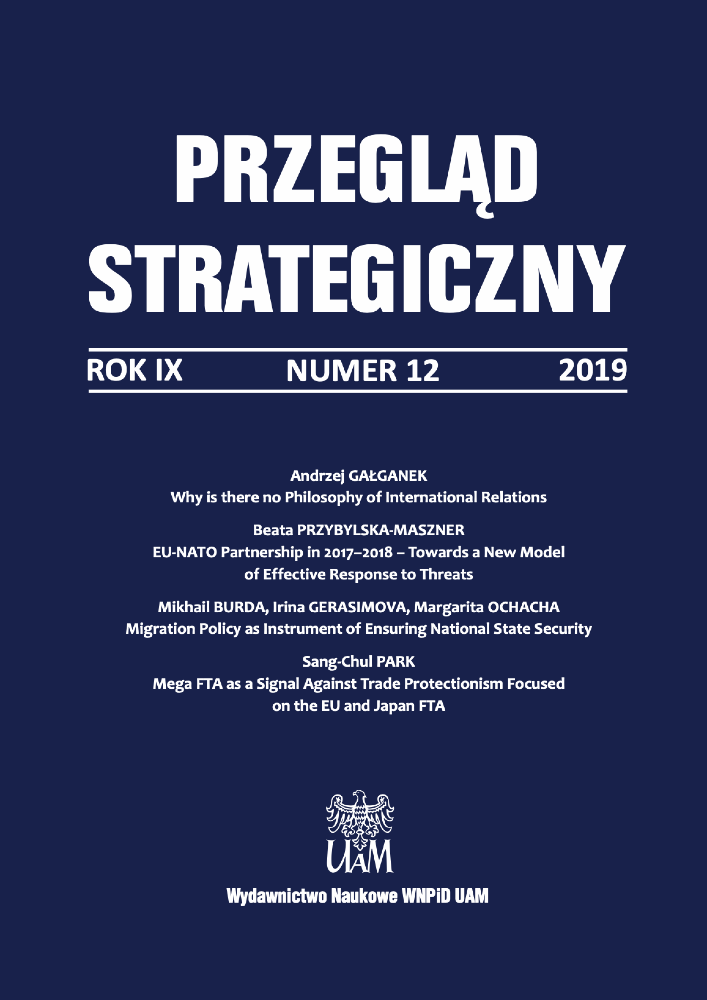Abstract
The paper aims to present water as a weapon of war in the Tigris-Euphrates Basin, as well as the role and significance of water for a new architecture of global security. The main goal of the study is to find an answer to the research question of whether water the Tigris-Euphrates Basin will be still a tool for fighting or cooperation as an effective tool for facing strategic challenges. The research hypothesis is that the issue of challenges related to water in the Euphrates River basin will, first of all, follow the social and political-economic relations between Turkey, Iraq and Syria and external factors. The research was conducted using a descriptive-analytical method. Moreover, this research is based on the neorealist theory of international relations, and the concept of international constellation analysis, as well as the theory of neo-institutionalism. Future anarchical global security architecture will lead to a hegemonic system of water relations. Therefore, without international coordination and far-reaching strategy in the face of the emerging anarchic global security structure, stable water cooperation in this region cannot be reached.
References
Abdelraouf M. (2018), West Asia Regional Cooperation on Water and Sustainable Development Goal 6, “EDA Insight”, October, http://eda.ac.ae/docs/default-source/Publications/eda-in- sight_wa-water-diplomacy_en_final.pdf?sfvrsn=2.
Amin A. (2017), The Age of Renewable Energy Diplomacy, “EDA Reflection”, October, http://eda.ac.ae/docs/defaultsource/Publications/eda_reflection_age_of_renewable_energy_ en.pdf?sfvrsn=2.
Ban Ki-moon (2016), Remarks to Security Council debate on Water, Peace and Security, United Nations Secretary General, 22.11.2016, https://www.un.org/sg/en/content/sg/speeches/2016- 11-22.
Cahan J. (ed.) (2017), Water Security in the Middle East, “Essays in Scientific and Social Coopera- tion”, Publisher: Anthem Press, Series: Anthem Water Diplomacy Series.
Cleveland C. (2010), China’s Monster Three Gorges Dam is About To Slow The Rotation Of The Earth, “Business Insider”, June 18, https://www.businessinsider.com/chinas-three-gorges- dam-really-will-slow-the-earths-rotation-2010-6.
Cuppari R. (2017), Water Diplomacy, International Centre for Water Resources and Global Change, Policy Brief Number 1/2017, http://www.waterandchange.org/wp-content/uploads/2017/06/ PB_WaterDiplomacy_lowres.pdf.
David M., Passarelli R. (2015), Conflict Basins: Powderkegs to Paecepipes, “SAIS Review”, Vol. 35, No. 1, Winter–Spring.
Deen T. (2014), U.N. Decries Water as Weapon of War in Military Conflicts, United Nations, IPS, May 19, http://www.ipsnews.net/2014/05/u-n-decries-water-as-weapon-of-war-in-military- conflicts/.
EU (2013), Council Conclusions on EU Water Diplomacy, Foreign Affairs Council, Brussels, 22 July, http://www.europarl.europa.eu/meetdocs/2009_2014/documents/droi/dv/1407_ councilconclusions_/1407_councilconclusions_en.pdf.
Government Offices of Sweden, Ministry of Foreign Affairs, Strategy for Sustainable Peace 2017–2022, https://www.government.se/490051/globalassets/government/block/fakta-och- genvagsblock/utrikesdepartementet/sanktioner/strategi-hallbar-fred-eng-slutlig.pdf.
Handy N. (2011), Turkey’s Shifting Relations with its Middle East Neighbors during the Davutoğlu Era: History, Power and Policy, Bilgi (23), Yaz.
Hefny M. (2011), Water Diplomacy: A Tool for Enhancing Water Peace and Sustainability in the Arab Region, “Technical Document”, Cairo, November, http://www.unesco.org/new/fileadmin/MULTIMEDIA/FIELD/Cairo/Water%20Diplomacy%20in%20Action%20Strategy%20Doc%203%20Rev%202%20Final%20and%20Action%20Plan%5B1%5D.pdf.
Huntjens P., de Man R. (2017), Water diplomacy: Making water cooperation work, The Hague Insti- tute Policy Brief, April, https://www.planetarysecurityinitiative.org/sites/default/files/2017- 04/PB_Water_Diplomacy_WG_4.pdf.
IPI (2018), Experts Call for Preventive “Water Diplomacy” in the MENA Region, (April 11), https:// www.ipinst.org/2018/04/preventive-water-diplomacy-mena-region#4.
IRENA (2018), Medium-term Strategy 2018–2022, Report of the Director-General of the Interna- tional Renewable Energy Agency, Eighth session of the Assembly, Abu Dhabi, 13–14 Janu- ary, https://www.irena.org/-/media/Files/IRENA/Agency/About-IRENA/Assembly/Eighth-Assembly/A_8_11_MTS-2018-2022.pdf?la=en&hash=07546C5D6CB968EEEDBEBE322 136DEF2AB389AFB.
Kamphof R., Melissen J. (2018), Foreign Ministries, SDG Diplomacy and the Private Sector, SWP Working Paper No. 22, April, https://www.swp-berlin.org/fileadmin/contents/products/ arbeitspapiere/WP_Diplomacy21_No22_Kamphof_Melissen.pdf.
Kibaroglu A. (2017), State-of-the-art review of transboundary water governance in the Euphrates Ti- gris river basin, “International Journal of Water Resources Development”, 07 Dec, https:// aquadoc.typepad.com/files/review_tb_water_governance_euphrates_tigris.pdf.
Kibaroglu A. (2015), Transboundary Water Governance in the Euphrates Tigris River Basin, “E- International Relations”, Jul 22, https://www.e-ir.info/2015/07/22/transboundary-water-gov- ernance-in-the-euphrates-tigris-river-basin/.
Kibaroglu A. et al. (2011), Turkey’s Water Policy, DOI 10.1007/978-3-642-19636-2_16, # Spring- er-Verlag Berlin Heidelberg 2011, https://www.iraqicivilsociety.org//wp-content/uploads/ 2013/02/Kibaroglu-scheumann-euphrates-tigris-river-system.pdf.
Kjellén B. (2004), Pathways to the Future: The New Diplomacy for Sustainable Development, “IDS Bulletin” 35(3): 107–113, DOI 10.1111/j.1759-5436.2004.tb00143.x.
Leight N. (2012), Water & Public Diplomacy, “Policy Brief”, April, https://www.uscpublicdiplomacy.org/sites/uscpublicdiplomacy.org/files/useruploads/u22281/Water_Diplomacy_Poli- cy_Brief_Online.pdf.
Menga F. (2016), Domestic and International dimensions of transboundary water politics, “Water Alternatives”, Vol. 9 (3), http://www.water-alternatives.org/index.php/alldoc/articles/vol9/ v9issue3/322-a9-3-17/file.
Motwani P. R. (2017), Water Cooperation Quotient, Strategic Foresight Group, Mumbai, https://www.strategicforesight.com/publication_pdf/Water%20Cooperation%20Quotient%202017. pdf.
OSCE (2014), Enhancing security through water diplomacy: The role of the OSCE, OSCE, Hofburg, 8 July, (SEC.DAYS/9/14/Rev.1), https://www.osce.org/sg/120018?download=true.
OSCE (2019), Environment and Security, (ENVSEC) Initiative, (07/04/2019), https://www.osce.org/ secretariat/ENVSEC.
OSCE (2014), Water diplomacy, 1 July, https://www.osce.org/sg/120614.
Pacific Institute (2019), Water Conflict Chronology, Pacific Institute, Oakland, CA. (27.08.2019), https://www.worldwater.org/water-conflict/.
Scheumann W., Shamaly O. (2016), The Turkish-Syrian Friendship Dam on the Orontes River: Benefits for All?, in: Water Resources Management in the Lower Asi-Orontes River Basin: Issues and Opportunities, Graduate Institute of International and Development Studies; Istanbul, MEF University, Geneva, https://docs.water-security.org/files/e%20Documents/ Lower%20Asi%20Orontes%202016/Chapter_12.pdf.
Schmeie S. (2018), What is Water Diplomacy and Why Should You Care?, “Global Water Forum”, August 31, http://www.globalwaterforum.org/2018/08/31/what-is-water-diplomacy-and- why-should-you-care/.
SFG (2011), Blue Peace: Rethinking Middle East Water, Strategic Foresight Group, Mumbai, https://www.eda.admin.ch/dam/deza/en/documents/publikationen/Diverses/198458-the-blue- peace_EN.pdf.
SFG (2015), Blue Peace: Rethinking Middle East Water, Strategic Foresight Group, Mumbai, https://www.strategicforesight.com/publication_pdf/28458Lessons%20Learnt.pdf.
SFG (2019), The Blue Strike List in the Middle East, “Blue Peace Bulletin”, Vol 3, https://www.strategicforesight.com/publication_pdf/Blue%20Strike%20List.pdf.
SFG (2017), Water Cooperation Quotient, Strategic Foresight Group, Mumbai, https://www.strategicforesight.com/publication_pdf/Water%20Cooperation%20Quotient%202017.pdf.
Srivastava L. (2014), Strengthening Multilateral Diplomacy and Sustainable Development, “The Magazine of the United Nations”, Vol. LI, No. 3, https://unchronicle.un.org/article/strengthe- ning-multilateral-diplomacy-and-sustainable-development.
Susskind L., Shafiqul I. (2012), Water Diplomacy: Creating Value and Building Trust in Transbound- ary Water Negotiations, “Science & Diplomacy”, Vol. 1, No. 3, September, http://www. sciencediplomacy.org/files/water_diplomacy_science__diplomacy.pdf.
UN (2018), High-Level Panel on Water Diplomacy, Deputy Secretary-General’s remarks, Stockholm (August 27), https://www.un.org/sg/en/content/dsg/statement/2018-08-27/deputy-secretary- generals-remarks-high-level-panel-water-diplomacy.
UN (2014), Strengthening Multilateral Diplomacy and Sustainable Development, “The Magazine of the United Nations” Vol. LI, No. 3, https://unchronicle.un.org/article/strengthening-multilat- eral-diplomacy-and-sustainable-development.
UNWATER (2018), Nature-Based Solutions for Water, “World Water Development Report”, 19 March, http://www.unwater.org/world-water-development-report-2018-nature-based- solutions-for-water/.
Wasinger C. (2015), Peace Be Dammed? Water Power and Water Politics in the Tigris-Euphrates Basin, Bowdoin College Bowdoin Digital Commons Honors Projects 5-2015.
Waslekar S. (2011), Blue Peace: Rethinking Middle East Water, Strategic Foresight Group, https://www.eda.admin.ch/dam/deza/en/documents/publikationen/Diverses/198458-the-blue- peace_EN.pdf.
Wirsing R., Jasparro C. (2007), River rivalry: Water disputes, resource insecurity and diplomatic deadlock in South Asia, “Water Policy” 9 (3), https://doi.org/10.2166/wp.2007.014.
Yıldız D. (2015), Water and H2O Difference in Terms of International Relationship, “World Scien- tific News” 10, www.worldscientificnews.com.
Zhupankhan A., Tussupova K., Berndtsson R. (2017), Could Changing Relationships Lead to Better Water Sharing in Central Asia?, “Water” 9 (20 February).

